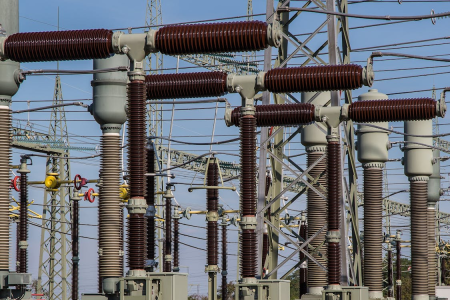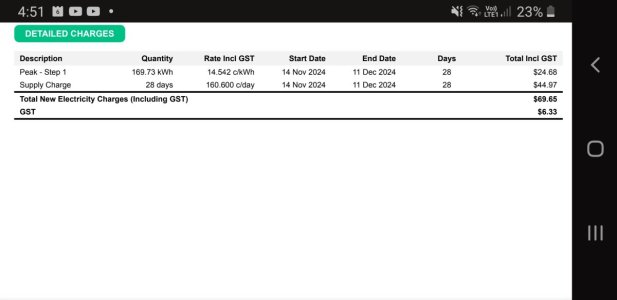You might be overpaying for electricity--here's what you might be missing
By
Maan
- Replies 10
Rising energy costs have become a growing concern for many households, leaving people wondering if they could be paying more than necessary for their electricity.
What seems like a small issue could actually be costing you big time over time. Recent findings have sparked questions about the true impact of staying with the same provider for too long.
The truth might surprise you, as new insights challenge what many Australians thought they knew about their energy plans.
The Australian Competition and Consumer Commission (ACCC) warned that as many as four in five households could have paid less for electricity by simply shopping around or calling their providers for a better deal.
The ACCC’s recent report highlighted the ‘loyalty penalty,’ which intensified the longer households waited to switch.
ACCC commissioner Anna Brakey explained, ‘If you haven’t changed electricity plans in the past 12 months, chances are you are paying more for your electricity than you need to.’
Consumers were urged to take advantage of the holiday period to compare offers. Websites like Energy Made Easy and Victoria Energy Compare were recommended as tools to find cheaper plans.
The findings revealed that customers on flat rate market offers older than two years paid, on average, 16.9 per cent (or $317) more annually than those on newer plans.
This report focused on the National Energy Market, covering NSW, Victoria, South Australia, and southeast Queensland.
It noted that while some benefits of newer plans were necessary to encourage consumers to switch, some were facing disproportionate penalties for not regularly reviewing their deals.
Despite ongoing efforts to promote plan-switching, many Australians still found changing energy providers intimidating. A survey conducted by comparison site Finder found that over one in five people felt switching was too much of a hassle.
Finder’s Taylor Blackburn explained: ‘You say the word ‘kilowatt hour’, and people’s eyes kind of glaze over. It actually is really simple.’
Households were charged a specific daily fee and a per kilowatt hour rate for their electricity.
Blackburn compared the ease of switching energy providers to filling up at a cheaper petrol station, suggesting that switching energy plans was as simple as making a quick phone call.
Blackburn also warned that promotional offers often expired, and households should be mindful of the expiry dates on introductory deals to avoid paying higher prices once the deal ends.
Over a third of Australians remained on energy plans more than two years old, despite numerous calls to encourage people to shop around.
The ACCC pointed out that more than 80 per cent of households within the National Electricity Market could save money by switching providers or negotiating a better deal.
However, confusion around terms like ‘best offer’ or ‘better offer’ may have hindered some consumers from making the switch, with retailers often using the same labels for both new and old offers.
The report also found that, on average, residential customers on flat-rate plans paid 4 per cent less between August 1, 2023, and August 1, 2024.
This decrease, however, was not enough to recover from price hikes in 2022 and 2023.
Although energy prices had decreased slightly in 2024, the report noted they remained higher than pre-2022 levels due to market volatility.
The ACCC’s calculations didn’t include government energy rebates, which helped reduce actual bills for many customers.
Treasurer Jim Chalmers also commented on the situation, stating: ‘Our reforms are helping, more people are shopping around for a better deal, there’s stronger competition between the retailers and better conditions in international energy markets.’

As energy prices continue to fluctuate, it's clear that taking a closer look at your electricity plan could make a real difference in your bills. Have you ever switched providers, or have you been sticking with the same plan for years? Share your thoughts or experiences in the comments below.
What seems like a small issue could actually be costing you big time over time. Recent findings have sparked questions about the true impact of staying with the same provider for too long.
The truth might surprise you, as new insights challenge what many Australians thought they knew about their energy plans.
The Australian Competition and Consumer Commission (ACCC) warned that as many as four in five households could have paid less for electricity by simply shopping around or calling their providers for a better deal.
The ACCC’s recent report highlighted the ‘loyalty penalty,’ which intensified the longer households waited to switch.
ACCC commissioner Anna Brakey explained, ‘If you haven’t changed electricity plans in the past 12 months, chances are you are paying more for your electricity than you need to.’
Consumers were urged to take advantage of the holiday period to compare offers. Websites like Energy Made Easy and Victoria Energy Compare were recommended as tools to find cheaper plans.
The findings revealed that customers on flat rate market offers older than two years paid, on average, 16.9 per cent (or $317) more annually than those on newer plans.
This report focused on the National Energy Market, covering NSW, Victoria, South Australia, and southeast Queensland.
It noted that while some benefits of newer plans were necessary to encourage consumers to switch, some were facing disproportionate penalties for not regularly reviewing their deals.
Despite ongoing efforts to promote plan-switching, many Australians still found changing energy providers intimidating. A survey conducted by comparison site Finder found that over one in five people felt switching was too much of a hassle.
Finder’s Taylor Blackburn explained: ‘You say the word ‘kilowatt hour’, and people’s eyes kind of glaze over. It actually is really simple.’
Households were charged a specific daily fee and a per kilowatt hour rate for their electricity.
Blackburn compared the ease of switching energy providers to filling up at a cheaper petrol station, suggesting that switching energy plans was as simple as making a quick phone call.
Blackburn also warned that promotional offers often expired, and households should be mindful of the expiry dates on introductory deals to avoid paying higher prices once the deal ends.
Over a third of Australians remained on energy plans more than two years old, despite numerous calls to encourage people to shop around.
The ACCC pointed out that more than 80 per cent of households within the National Electricity Market could save money by switching providers or negotiating a better deal.
However, confusion around terms like ‘best offer’ or ‘better offer’ may have hindered some consumers from making the switch, with retailers often using the same labels for both new and old offers.
The report also found that, on average, residential customers on flat-rate plans paid 4 per cent less between August 1, 2023, and August 1, 2024.
This decrease, however, was not enough to recover from price hikes in 2022 and 2023.
Although energy prices had decreased slightly in 2024, the report noted they remained higher than pre-2022 levels due to market volatility.
The ACCC’s calculations didn’t include government energy rebates, which helped reduce actual bills for many customers.
Treasurer Jim Chalmers also commented on the situation, stating: ‘Our reforms are helping, more people are shopping around for a better deal, there’s stronger competition between the retailers and better conditions in international energy markets.’
Key Takeaways
- Many households are paying more for electricity because they haven't switched plans in over a year.
- The ‘loyalty penalty’ means those on older plans are paying significantly higher prices.
- Switching energy providers is simple and can be as easy as making a phone call.
- Over 80 per cent of households could save money by shopping around for a better deal.
As energy prices continue to fluctuate, it's clear that taking a closer look at your electricity plan could make a real difference in your bills. Have you ever switched providers, or have you been sticking with the same plan for years? Share your thoughts or experiences in the comments below.









